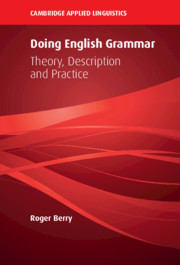Book contents
- Doing English Grammar
- The Cambridge Applied Linguistics Series
- Doing English Grammar
- Copyright page
- Contents
- Figure
- Tables
- Editors’ Preface
- Introduction
- 1 The Place of Grammar
- 2 What Is Grammar?
- 3 The Need for New Descriptions
- 4 Working with Terminology
- 5 Issues in Grammatical Description
- 6 Grammar in Operation
- 7 Case Study 1
- 8 Case Study 2
- 9 Case Study 3
- 10 Case Study 4
- Conclusion
- Appendices
- Index
- References
5 - Issues in Grammatical Description
Published online by Cambridge University Press: 02 March 2021
- Doing English Grammar
- The Cambridge Applied Linguistics Series
- Doing English Grammar
- Copyright page
- Contents
- Figure
- Tables
- Editors’ Preface
- Introduction
- 1 The Place of Grammar
- 2 What Is Grammar?
- 3 The Need for New Descriptions
- 4 Working with Terminology
- 5 Issues in Grammatical Description
- 6 Grammar in Operation
- 7 Case Study 1
- 8 Case Study 2
- 9 Case Study 3
- 10 Case Study 4
- Conclusion
- Appendices
- Index
- References
Summary
This chapter outlines a number of issues which are important in grammatical description (though they are often taken for granted) and which can affect readers’ understanding: the depth and refinement of the description, how to distinguish between different uses, and how to recognise and verbalise the concepts of formality and acceptability. Following this there is a consideration of three other important issues based on a research project (METALANG) using a corpus of grammatical description:
personality – e.g. whether to use personal pronouns (we, you) to address the reader, or a passive, and the pros and cons of each;
modality – the use of e.g. modal auxiliaries such as can and adverbs such as generally to indicate some form of hedging on statements, which is very common;
sub-technical vocabulary – e.g. the use of words such as ‘state’, ‘action’, ‘event’ to describe the meaning of verbs.
- Type
- Chapter
- Information
- Doing English GrammarTheory, Description and Practice, pp. 92 - 124Publisher: Cambridge University PressPrint publication year: 2021



